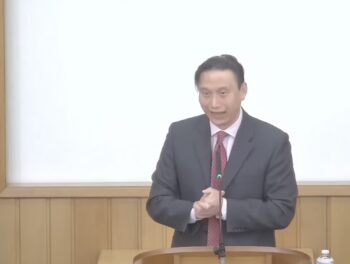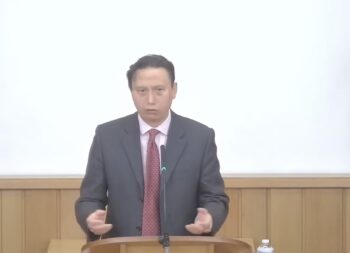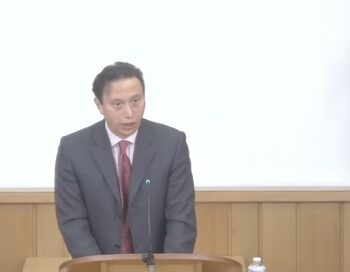Harry Chen got saved because of the dictionary.
He grew up in communist China, where they instilled atheism into kids. They never used the word “eternal” or “everlasting” because in the atheist conception, there’s no such thing.
So when he stumbled across the word in the dictionary, he wondered: Was there eternal life? Why would the word exist in the language if there was no corresponding reality?
Harry Chen was born in China at the beginning of the Cultural Revolution, a time of purging anyone disloyal to Chairman Mao. As a child, he trooped along with his parents to the patriotic parades extolling the communist party, he tells on the Gospel Hall Audio channel of YouTube.
His first sentences in Chinese characters that he learned in school were “Long live the Communist Party” and “Long live Chairman Mao.”
His parents were sports coaches, so he grew up happily playing all kinds of sports at the Sports Complex.
 A friend of a friend wrote him a letter when he was a student at Shandong University because he saw Harry mentioned in the newspaper. Corresponding by regular mail before the internet was invented, the friend gently broached the subject, writing: Is it possible that there is everlasting life?
A friend of a friend wrote him a letter when he was a student at Shandong University because he saw Harry mentioned in the newspaper. Corresponding by regular mail before the internet was invented, the friend gently broached the subject, writing: Is it possible that there is everlasting life?
“I said, Wow, good question. I want to search for it. When you say something to a friend, you never say, everlasting or eternal or forever. You don’t say it because nothing is eternal. But I read it in the dictionary and I said, interesting. How can I know it?”
Tantalized by the possibility of eternal life and energized by his heart’s intuitive resonance with the idea that human consciousness doesn’t extinguish at death, Harry embarked on a quest to discover the truth.
His first clue came from a foreigner from Africa who mentioned scriptures from the Bible. His second clue was from a foreigner doing business in China who again mentioned the Bible.
“I had zero knowledge about the Bible,” he says. “I just know that it is a famous book, but I didn’t know what it is about.”
 At the time, the Bible was pretty much banned in China, which didn’t like competition for god-status, which it reserved for the communist party and Chairman Mao.
At the time, the Bible was pretty much banned in China, which didn’t like competition for god-status, which it reserved for the communist party and Chairman Mao.
Where could he find a Bible? he wondered.
His first readings were some Bible tracts, which mentioned scriptures. They were printed in Hong Kong in the old style Chinese character. He read about the free gift of eternal life through believing in Jesus Christ. He had an unquenchable desire to know the God of everlasting life.
Finally, Harry managed to get his hands on a Bible and he read it eagerly.
“I was thirsty,” he says.
Harry read John 3:16: For God so loved the world that He gave His one and only Son, that whoever believes in Him shall not perish but have eternal life.
There was his answer: He only needed to believe in Jesus to receive everlasting life. He chose to believe and was born again.
In 1993, he started attending a Bible study in China. His family also got saved one by one.
In 2003, he emigrated to Canada, where he now lives and participates in a church.
If you want to know more about a personal relationship with God, go here
About the writer of this article: Antonio Pellot lives in Los Angeles and studies at the Lighthouse Christian Academy.




